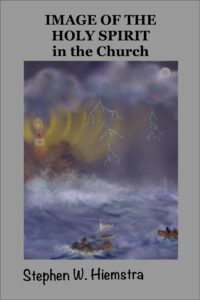Cautionary Tale

Our fathers were all under the cloud,
and all passed through the sea,
and all were baptized into Moses in the cloud and in the sea,
and all ate the same spiritual food,
and all drank the same spiritual drink.
(1 Cor 10:1-4)
By Stephen W. Hiemstra
In the context of discussing the eating of food offered to idols, his rights as a worker in the church, and personal discipline, the Apostle Paul tells a most curious tale about the people of Israel during their time in the wilderness. During this time, they followed the Shekineh cloud, they were collectively baptized in crossing the Red Sea, and they ate spiritual food (manna) and drank spiritual water (from the rock). Yet, still they sinned and came under God’s judgment (1 Cor 10:6-14).
The immediate lesson that Paul offered this passage was about food sacrificed to idols, but the implications extend further. In spite of the advantages of good genes and a spiritual life, the people of Israel sinned and came under judgment. The obvious parallel is with the church in baptism and communion and other blessings. In the case of food offered to idols, Paul concludes: “All things are lawful, but not all things are helpful. All things are lawful, but not all things build up.” (1 Cor 10:23)
Paul mentions law twice in his conclusion. Righteousness under law is a matter of not breaking the law—a measure of holiness—but Paul measures conduct in this statement with the words “helpful” and “build up.” These are measures not of holiness (being set apart by law), but of godliness (being set apart by grace). Sacrificing food to idols is meaningless for a Christian, but it is not helpful—others might see you and be led astray—and it does not build up the church—what are you doing in a pagan temple? Paul again concludes: “So, whether you eat or drink, or whatever you do, do all to the glory of God.” (1 Cor 10:31)
Communion
This discussion of food sacrificed to idols and the caveats implicit in the tale of the people of Israel functions as a lengthy prologue to Paul’s discuss of communion:
“For I received from the Lord what I also delivered to you, that the Lord Jesus on the night when he was betrayed took bread, and when he had given thanks, he broke it, and said, this is my body, which is for you. Do this in remembrance of me. In the same way also he took the cup, after supper, saying, This cup is the new covenant in my blood. Do this, as often as you drink it, in remembrance of me. For as often as you eat this bread and drink the cup, you proclaim the Lord’s death until he comes.” (1 Cor 11:23-26)
The key phrase that introduces the Lord’s Super is: “Do all to the glory of God.” (1 Cor 10:31) Just like the Israelite people were not saved by their genealogy and spirituality, neither are Christians. In taking communion, we remember Christ Jesus and glorify God according to Paul. Salvation is through faith in Christ by grace. Again Paul offers this advice subtly through analogy to the experience of the people of Israel in the wilderness and a discussion of food offered to idols.
Baptism
Paul’s reference to baptism cited above is fascinating. He writes: “And all were baptized into Moses in the cloud and in the sea.” (1 Cor 10:2) The people of Israel were baptized both by the (Shekineh) cloud and the sea. This ties baptism to the Holy Spirit much like the Apostle Peter did on the day of Pentecost:
“Repent and be baptized every one of you in the name of Jesus Christ for the forgiveness of your sins, and you will receive the gift of the Holy Spirit.” (Acts 2:38)
This same link between baptism and the Holy Spirit appears elsewhere in Paul’s writing:
“There is one body and one Spirit—just as you were called to the one hope that belongs to your call—one Lord, one faith, one baptism, one God and Father of all, who is over all and through all and in all.” (Eph 4:4-6)
I used to think that the Holy Spirit came into our lives like a direct telephone connection to God—God’s omnipresence became more real—but I gave up that idea because the first instance of prayer in Genesis was with a gentile king, Abimelech (Gen 20), who obviously had no previous connection.
For the early church, baptism apparently posed some problems both because of interpretation and association. Paul writes:
“Do you not know that all of us who have been baptized into Christ Jesus were baptized into his death? We were buried therefore with him by baptism into death, in order that, just as Christ was raised from the dead by the glory of the Father, we too might walk in newness of life.” (Rom 6:3-4)
Here Paul sees Jesus’ baptism as part of a template that we, as Christians, must follow (e.g. Phil 3:10). Elsewhere, Paul finds some thinking that baptism implied following the baptizer:
“Is Christ divided? Was Paul crucified for you? Or were you baptized in the name of Paul? I thank God that I baptized none of you except Crispus and Gaius.” (1 Cor 1:13-14)
Unity of the church required careful instruction, as in the cite from Ephesians above.
Between the quote from Peter in Acts 2 and that of Paul in Romans 6, we see the two primary interpretations of baptism: Baptism as the symbolic washing away of sin and as participating in the death and resurrection of Christ. Both are widely held views today.
Cautionary Tale
Also see:
The Face of God in the Parables
The Who Question
Preface to a Life in Tension
Other ways to engage online:
Author site: http://www.StephenWHiemstra.net
Publisher site: http://www.T2Pneuma.com
Newsletter at: https://bit.ly/busy_25, Signup
The post Cautionary Tale appeared first on T2Pneuma.net.



